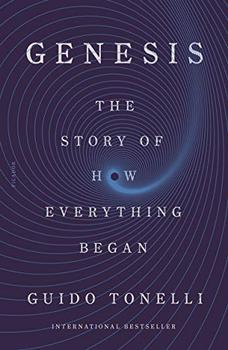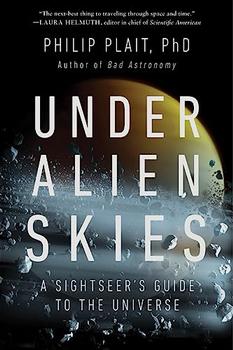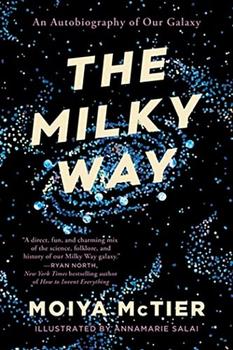Summary | Excerpt | Reviews | Beyond the book | Read-Alikes | Genres & Themes | Author Bio

The Story of How Everything Began
by Guido TonelliPopular science books represent an important niche in non-fiction. They build a bridge between academic journals that may only be accessible to readers with a PhD of their own and the layperson who is eager to know more but may not have the necessary background for it. By reading books like Stephen Hawking's A Brief History of Time and Yuval Noah Harari's Sapiens, we gain access to a world of scientific knowledge, condensed into digestible information for the everyday reader.
Genesis by Guido Tonelli provides its own bridge into the origins of the universe. Occasionally, it proves to be a little too intense for the person of average knowledge, presenting scientific and mathematical theories without a useful metaphor to guide us through the mire. Most of the time, however, Tonelli takes complex theories and observations, and offers them to us in a way that is at once fascinating and accessible.
Genesis starts with a brief history of astronomy, first explaining the writings of Greek philosophers, the observations of Galileo and the theories of Einstein, and next moving on to the cause and events of the Big Bang. Following this pair of introduction sections, the bulk of the book takes the origins of the universe and chops it into seven chapters, loosely mirroring the seven days of the Biblical Genesis story. These chapters trace the initial catalyst that kicked off the Big Bang and eventually move into the formation of stars and planets.
The approach Tonelli takes to explaining this science is a double-edged sword. He tries to avoid the more complex theories and discoveries of modern-day astrophysics, but still has to dig into some hard-to-follow mathematics. The payoff for this, however, is finally getting answers to questions many of us have had since high school. For example, it is fairly common knowledge that the universe began with an explosion — an infinitesimally small one that expanded outward and continues to cool and expand to this day. But what caused the Big Bang to happen in the first place? This question has pestered me for years, and Genesis gives us two answers — one which is now outdated and another which is a current favorite amongst physicists — and puts them into context. The original answer is that the universe is an endless cycle of expansion and contraction, behaving — as Tonelli states — like an accordion, and that this is what caused the initial explosion. However, he explains that this theory has been disproven, then moves into a more modern, more complex, but equally beautiful and compelling theory.
This is just one early instance of the gripping, exhilarating moments that come often and hit hard when reading Genesis. It is a book of constant surprises, one that leads to a real feeling of growth and understanding. While it can overwhelm, the end result is one of enlightenment.
Tonelli has fun with mythology, religion and philosophy. He remarks on the human thirst for knowledge and our tendency to look up when asking the big questions, tying science into creation myths in a respectful and entertaining way (see Beyond the Book). For example, when touching on the accordion theory of universal expansion, he references a Buddhist concept in considering how "the universe itself would be subject to Samsara, the wheel of existence that imprisons living beings in a series of countless incarnations." By doing this, Tonelli keeps the topic of creation relevant to the human experience, allowing us to understand how events that occurred in the depths of space 13.8 billion years ago are intrinsically tied to our own thoughts and musings, as well as the very foundations of our cultures and religions.
Special praise must also be given to translators Erica Segre and Simon Carnell. They have managed to take some of the most complex scientific theories (and some very colorful metaphors) from the original Italian and recreate them with beauty and elegance. The English-language version of Genesis is a masterpiece of translation as much as popular science.
Tonelli's book is for any reader who has ever had a mental itch concerning creation and the behavior of the universe. While it can overwhelm at times, it rewards us with a greater understanding of how everything around us came to be and the journey we took to get where we are.
![]() This review was originally published in The BookBrowse Review in May 2021, and has been updated for the
May 2022 edition.
Click here to go to this issue.
This review was originally published in The BookBrowse Review in May 2021, and has been updated for the
May 2022 edition.
Click here to go to this issue.

If you liked Genesis, try these:

by Philip Plait
Published 2024
A rip-roaring tour of the cosmos with the Bad Astronomer, bringing you up close and personal with the universe like never before.

by Moiya McTier
Published 2023
Astrophysicist and folklorist Dr. Moiya McTier channels the Milky Way in this approachable and utterly fascinating autobiography of the titular galaxy, detailing what humans have discovered about everything from its formation to its eventual death, and what more there is to learn about this galaxy we call home.
Your guide toexceptional books
BookBrowse seeks out and recommends the best in contemporary fiction and nonfiction—books that not only engage and entertain but also deepen our understanding of ourselves and the world around us.